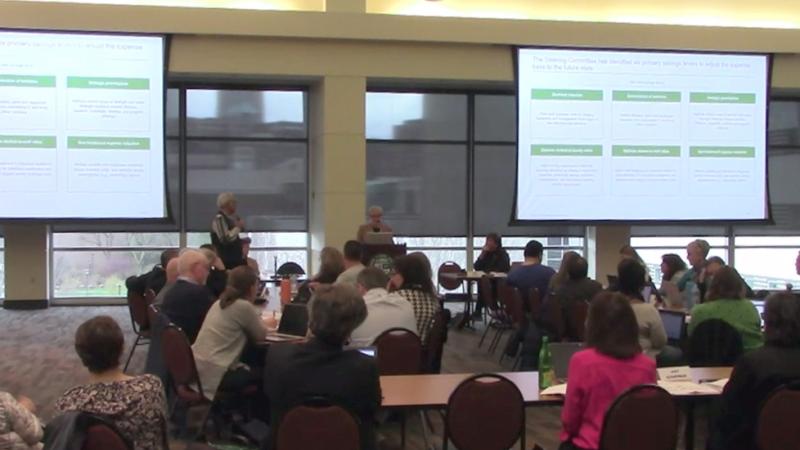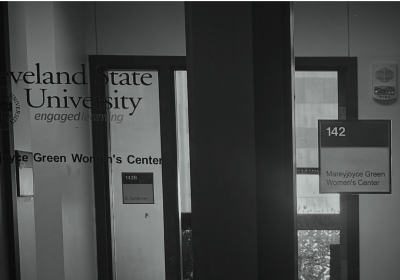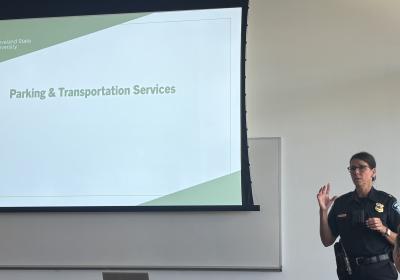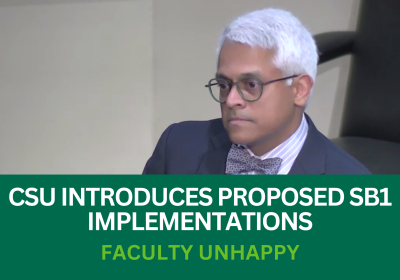
'Right size' is the new buzzword as CSU looks to deflate ballooning deficit
Cleveland State University's President Laura Bloomberg, Ph.D., announced plans at a faculty senate meeting April 3 to offer “voluntary separation incentive packages” to faculty and staff as part of the administration's attempt to shrink and eventually eliminate a ballooning budget deficit.
"Obviously I will stop short of coercion," Bloomberg told faculty at the meeting, "but that opportunity is what will have to happen to right size the university."
CSU is required by state law to balance its budget. Currently the deficit is in the $20 million range. But it's expected to grow to $40 million by 2029 unless steps are taken to address the imbalance between revenue and expenditure.
Bloomberg said that in large part the deficit reflects national trends, including the unprecedented impact of COVID on education. However, with hindsight, it also reflects unrealistic projections built into the planned revamp of the university known as CSU 2.0 adopted by the previous administration and endorsed by the board of trustees.
Bloomberg said she was hoping the trustees would approve siphoning $9 million from the university's reserve fund to finance the separation incentive. By making this one-time investment, she said CSU could generate recurring savings of $11 million as this strategy aims to help the current financial strain on the university and improve its long-term financial stability.
"I do believe that we will emerge from this with a right-sized institution that I think is what most of us are here for," Bloomberg said. "But we will go through pain to get there. And none of us, myself included, is immune from that."
On April 9, CSU’s board of trustee’s approved the $9 million investment the administration is looking for.
The plan allows qualifying faculty and staff who have spent 10 or more years at CSU to voluntarily end their employment at the university and receive a one-time lump sum payment equal to the employee’s annual salary.
Bloomberg says CSU 2.0 student and faculty growth plans won’t be achieved
During the faculty senate meeting, Bloomberg said that the university will not achieve CSU 2.0’s goals of increasing the student population to 20,000 and adding 100 faculty members by 2025.
“We're not going to make it to 20,000 students in the near term,” Bloomberg said. “Some of you can say, well, I could have told you that a while ago. We could relitigate that or we could put our energy into where we're going now.”
According to Signal Cleveland, CSU enrolled 14,175 students in fall 2023, a 13 percent drop from the nearly 16,330 students enrolled in 2018. Current projections have the university’s enrollment falling to 13,000 students by 2029.
Given the reduced student numbers, Bloomberg said on April 16 at a public forum that the university was looking to reduce its current faculty of 500+ by 60-80 full-time researchers and teachers.
Bloomberg told the senate the plan had always been to sunset CSU 2.0 in 2025, but added that parts of it had situated Cleveland State well in terms of thinking about how to move forward.
Board pauses proposed universal textbook fee
CSU Student Government Association’s (SGA) Director of Marketing & Technologies, Anastasia Hunt, updated the faculty senate on results from a student survey regarding an administrative initiative to set a universal textbook fee for students.
The SGA believes that the proposed fee will lead to many students paying more for textbooks than they do now.
"A vast majority of students of the student body will be disproportionately overcharged if we implement this contract," Hunt said.
The SGA survey asks students how they felt about the envisioned textbook fee, how much they currently spend on textbooks and how they access them.
Hunt said that, out of the 568 students who have filled out the survey to date, 86 percent indicated they would rather buy their own textbooks than pay a $150 flat fee. Seventy percent of respondents said they would rather buy their own textbooks than pay a flat fee of $100.
"The Student Government Association just asks you to listen to the students and listen to the faculty," Hunt concluded. "We're your most reliable source of information."
Faculty senate President Anup Kumar, Ph.D., responded by saying that the board of trustees had paused the proposed fee, which the administration would revisit.
The next CSU faculty senate meeting is scheduled for April 24.







